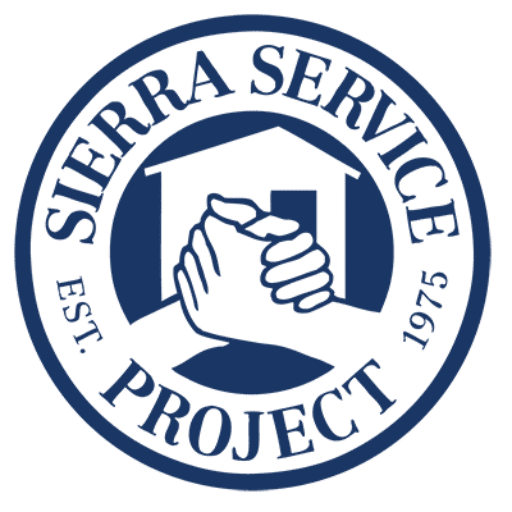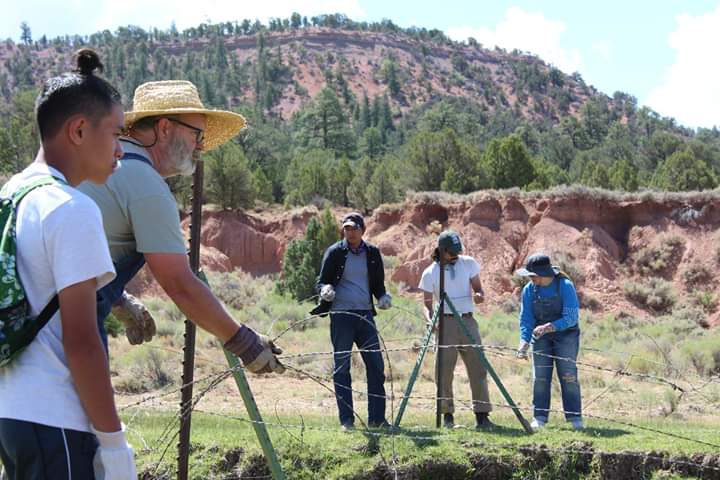By Tsaile Summer Staff 2020 – Schylar Ferguson (Spiritual Life Coordinator), Zachary Hendrix, Sean Neades (Site Director), Lane Reynolds, and Ronnie Swenson
Welcome to Tsaile, Arizona! Sierra Service Project has worked in the community since 2013 and served throughout the Navajo Nation since 1994. We are excited to continue deepening our connections with the community despite being physically separate. Tsaile is a small community nested in the much larger Navajo Nation. The Navajo Nation is about 27,000 square miles, larger than the state of West Virginia!
“We have worked in the community since 2013 and served throughout the Navajo Nation since 1994“
The Nation consists of Navajo people, or Diné, who have their own culture, practices, traditions, and their own government. Traditional practices are a huge part of life as households span many generations of people, like great-grandparents living with their great-grandchildren. Relatives and relationships between relatives are important to Diné people and these relationships come from their clan system. Clans are the building blocks of relationships for the Diné. Our long-time community contact, Silver Nez Perry, provides a foundation for us to understand these dynamics. This information is largely gathered from hearing him speak to participants most summers.
“Clans are the building blocks of relationships for the Diné. Our long-time community contact, Silver Nez Perry, provides a foundation for us to understand these dynamics.“
For Diné, there are four primary relationships that determine your four clans: your mother’s clan, your father’s clan, your mother’s mother’s clan, and your mother’s father’s clan. From these relationships you have siblings, parents, grandparents, aunts and uncles, and children that do not correlate to the Western understanding of children, parents, and relatives. In Diné culture, the mother is not necessarily the person who gave birth to you. Mother, father, grandmother, grandfather, and so on are more like statuses in the clan rather than birth relationships. If you were to meet someone that has the status of your mother but is someone you have never met before, you would be required by tradition to talk to her with the same respect that you would give to the person who gave birth to you.
The Navajo Nation has been disproportionately affected by Covid-19, bringing to light the many inequities and systemic injustices that have existed for centuries. This is due to the combination of many things such as being a food desert, lack of nearby medical care, information shared with the public about the seriousness of the pandemic, and underlying health issues such as diabetes and asthma. These health disparities are deeply rooted in structural and historical racism, and are an even greater risk now than ever. Our staff worked with Franklin Sage, Director of the Diné Policy Institute, to better understand these issues and what community advocates have been doing to improve the lives of their neighbors.
“The Navajo Nation has been disproportionately affected by Covid-19, bringing to light the many inequities and systemic injustices that have existed for centuries.“
The effort to curb the spread of Covid-19 has led to other challenges in the community, such as the lack of in-person connection to family and friends in a culture that has always gathered communally. There have also been lockdowns and curfews put into place which make it hard for many families to get food and water due to the long two-hour or longer drive to nearby grocery stores.
“The effort to curb the spread of Covid-19 has led to other challenges in the community such as the lack of in-person connection to family and friends in a culture that has always gathered communally.“
Tsaile, in particular, relies on a natural spring to provide water to all members of the community. Recent curfews have created long lines and great difficulty to even access clean drinking water, let alone water for crops, livestock, and other needs. The Dineh Water Users Association, which we have worked with for several years, is a locally operated organization that provides resources, education, and empowerment for small farmers. The Water Users have been active during the pandemic to support the community and provide access to essential services and equipment, like high capacity water tanks.
“The Diné Water Users Association, which we have worked with for several years, is a locally operated organization that provides resources, education, and empowerment for small farmers.“
As we are at home and staying physically distant from the communities we typically serve with, we still have the opportunity to stay connected with them. Below are some resources you can use to stay in touch with Tsaile and the greater Diné community!
Editor’s Note: Check out our Facebook and Instagram pages to watch our Tsaile summer video and see how we served safely in place this summer!

